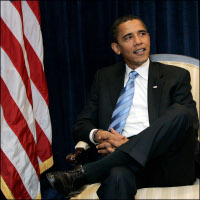Registration
You will receive an email confirming your registration.
IMGXYZ1056IMGZYXBarack Obama will face one of the toughest agendas of any previous U.S. president in recent history. To be a success he will need to prioritize certain items—the financial crisis, Pakistan, Iran—at the expense of others—climate change, Israel-Palestine—and, inevitably, disappoint some of his supporters both at home and abroad.
Just three days after Barack Obama was elected to lead the U.S. , Jessica T. Mathews, President of the Carnegie Endowment for International Peace; Bob Singh, Fellow at the Renaissance Society of America (RSA); and Michael Cox, Professor of International Relations at the London School of Economics and Political Sciences (LSE) and co-Director of LSE IDEAS, met in London to discuss the agenda of the next U.S. President, the expectations placed upon him, and the likelihood of him meeting those expectations.
The panel noted that the election of Obama in itself has already precipitated a major change in the international arena. Jessica T. Mathews opened by saying that for the first time in years, the U.S. 'is no longer in the dog house.' That Obama is exceedingly popular globally indicates a major shift in the perception and expectations of the U.S. and the U.S. presidential role.
However, on a more negative note, the panel remarked that Obama's popularity could also have adverse effects - Europe, and the rest of the world, are likely to be disappointed on a number of issues. Mathews commented that Obama is likely to disappoint on climate change (among others), Cox thought that this would also be the case with the Israel-Palestine issue, and Bob Singh gave the impression that the next administration would be unable to meet any of Europe's expectations.
- Mathews remarked that the financial crisis is likely to get worse. Dealing with the crisis will require reform of both the national and financial regulatory systems. There will need to be collaboration and discussion between the U.S. and Europe immediately on this issue.
- The war in Afghanistan and the situation in Pakistan are going into a tailspin. Afghanistan is likely to be the first big area of contention between the U.S. and Europe during the next administration. A policy on Pakistan will need to be created.
- The U.S. will partner Europe on Iran, but is likely to ask for sanctions on refined oil products which will not only hurt the regime in Iran, but also the states which carry out the sanctions – particularly Germany.
